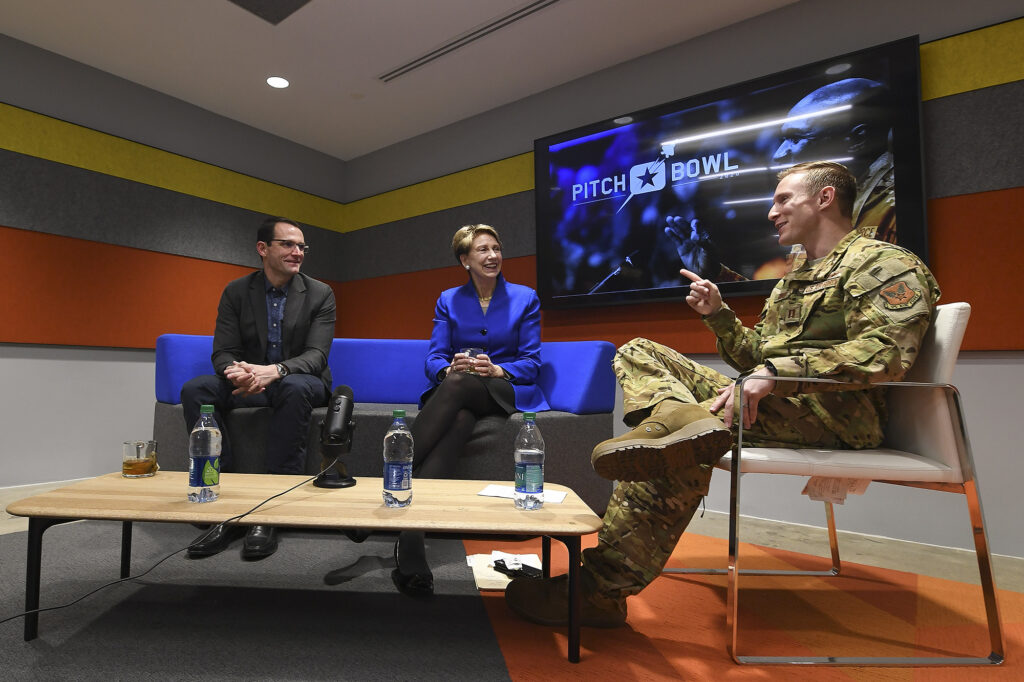
Will Roper (left), Barbara Barrett (center)
WASHINGTON: The resignations of five top Air Force officials on Jan. 19, including Secretary Barbara Barrett and acquisition czar Will Roper, are nothing more than normal practice for a presidential transition, say myriad DoD and expert sources.
While the optics of their joint goodbye ceremony, slated Jan. 14, are a bit odd — especially in light of the turmoil resulting from the Jan. 6 storming of the Capitol by supporters of outgoing President Donald Trump — a number of insiders said the reason is simply that, given the COVID-19 pandemic, it was considered safer to hold only one event.
“This is business as usual. Secretary Barrett, and the other confirmed senior leaders of the service, expect to leave as part of the normal transition,” said one source close to the secretary.
“It’s only a week before the new administration takes over and all political appointees needed to have tendered their resignations,” explained Dave Deptula, a retired Air Force general and dean of the Mitchell Institute.
Air Force spokesperson Ann Stefanek confirmed: “They are not leaving early. All political appointees submit a letter of resignation at the end of an administration.”
The Air Force announced today that Barrett, Roper, and assistant secretaries Shon Manasco, John Roth, Thomas Ayres, and John Henderson all will be feted by Air Force Chief of Staff CQ Brown and Space Force CSO Gen. Jay Raymond on Jan. 14 at Joint Base Anacostia-Bolling, Washington, D.C.
Manasco has been tapped by DoD to continue serving through the early days of the administration of President-elect Joe Biden to help with the transition — a role one source jokingly called “the designated survivor.” Whether or not he stays, of course, is up to the Biden team.
Meanwhile, there has been a rumor circulating for some time that Roper might be tapped to step back into the Pentagon to take replace Ellen Lord, undersecretary of Defense for acquisition and sustainment Roper is known for his championship of bold new approaches to improve and speed defense acquisition (as well as his love of science fiction.) And he is as bipartisan as they come. He was actually appointed to his first DoD job — launching the Strategic Capabilities Office — way back in 2012 under the Obama administration.
“He is familiar with rapid acquisition, fast fail, technology, non-traditional industry partners, etc…. There are others in the mix, but Will stands out,” one veteran Capitol Hill and Pentagon expert told us.
“Will is an incredibly talented person, and I expect that he will continue to be disruptive in positive ways,” another source said.
That said, one long-time Air Force watcher noted that Biden is likely to want to “sweep the decks.” And, of course, there are a lot of people waiting in the wings.
For example, Andrew Hunter, director of the Defense-Industrial Initiatives Group at the Center for Strategic and International Studies (CSIS), also “may be in line for something in the DoD acquisition world,” said Tom Mahnken, president of the enter for Strategic and Budgetary Assessments (CSBA). Hunter, now at the Center for Strategic and International Studies (home of the presumptive DepSecDef), is a former DoD acquisition expert under Obama, appointed in 2013 as director of the Joint Rapid Acquisition Cell.
Paul and Colin both contributed to this story.
Air Force picks Anduril, General Atomics for next round of CCA work
The two vendors emerged successful from an original pool of five and are expected to carry their drone designs through a prototyping phase that will build and test aircraft.


























